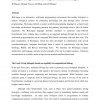61 search results - page 8 / 13 » Detecting inconsistency in biological molecular databases us... |
BIOINFORMATICS
2005
13 years 7 months ago
2005
BioLingua is an interactive, web-based programming environment that enables biologists to analyze biological systems by combining knowledge and data through direct end-user progra...
BMCBI
2010
13 years 7 months ago
2010
Background: Primer and probe sequences are the main components of nucleic acid-based detection systems. Biologists use primers and probes for different tasks, some related to the ...
CMSB
2003
Springer
14 years 20 days ago
2003
Springer
Biochemical pathways such as metabolic, regulatory or signal tranduction pathways can be viewed as interconnected processes forming an intricate network of functional and physical...
BIBM
2008
IEEE
14 years 1 months ago
2008
IEEE
The study of gene function is critical in various genomic and proteomic fields. Due to the availability of tremendous amounts of different types of protein data, integrating thes...
BMCBI
2008
13 years 7 months ago
2008
Background: The explosive growth of biological data provides opportunities for new statistical and comparative analyses of large information sets, such as alignments comprising te...

